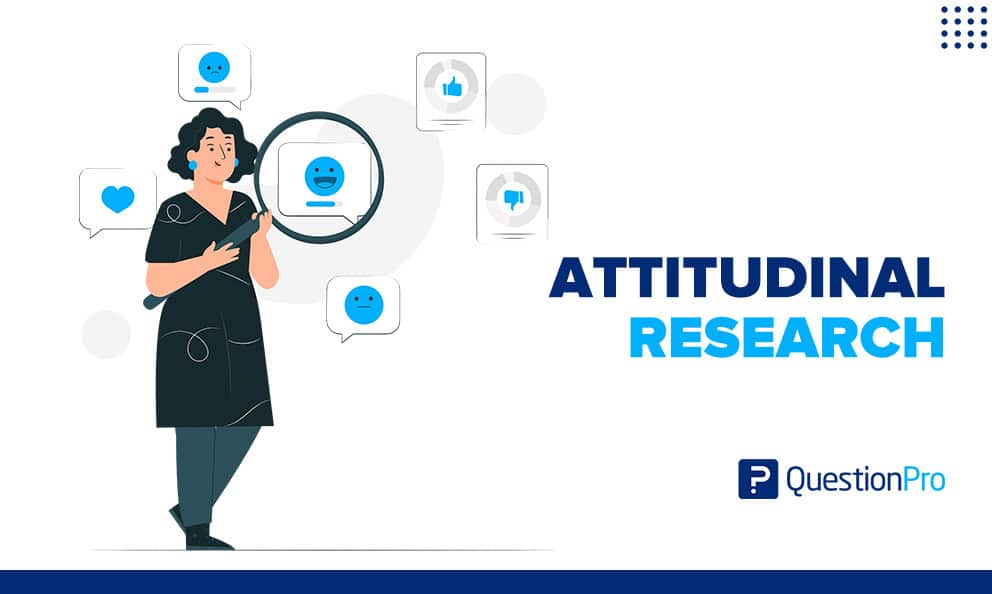 Reading Time: 3 minutes read
Reading Time: 3 minutes readAttitudinal research is conducted by asking people questions about their feelings and attitudes on a certain topic. It can be done in person or online and usually takes the form of surveys.
What is Attitudinal Research?
Attitudinal research is a type of market research that is used to measure how people feel about an idea, product, or service. This type of research can be used for a wide variety of purposes including measuring consumer satisfaction with products and services, understanding customer needs, identifying new product opportunities, and gauging public opinion on social issues.
This type of research often requires a higher level of commitment from both the researcher and the participants, but the rewards can be significant in terms of the insights gained.
This kind of research measures the attitudes and opinions of people. That’s why we call it attitude research or opinion research. It can be used to measure the attitudes and opinions of customers, employees, or other stakeholders in a company. It can be qualitative or quantitative research:
- Qualitative attitudinal research uses open-ended questions to get at the underlying reasons for people’s attitudes and opinions.
- Quantitative attitudinal research uses closed-ended questions to get at the frequency with which people have certain attitudes and opinions.
Attitudinal Research helps companies understand their customers better by measuring their satisfaction levels, what they like about a product, what they don’t like about it, how likely they are to buy it again etc.
Importance of Attitudinal Research
The importance of research helps by putting a company in the position to engage with their consumers by evaluating their experience and overall satisfaction with a product or service. By receiving feedback from their consumers they can fix and modify their product to better ensure instant gratification from the customer.
Attitudinal research is a form of research that is employed to gauge the attitude of people. This can be done by conducting a survey and then analyzing it in order to find out how positive or negative the public feels about an idea, product, service, etc.
This helps businesses learn more about their consumers and what they are looking for in order to provide them with better products in the future.
The advantages
- It can provide an in-depth understanding of how consumers feel about a product or service.
- Attitudinal data can help to identify opportunities for innovation and new product development, as well as potential problems within the company’s marketing strategy.
- Attitudinal data can be gathered through many different methods including focus groups, surveys, interviews, and observation.
The disadvantages
- Attitudinal research is not always reliable because it relies on the respondents’ honesty and memory.
- Attitudinal research takes a long time to conduct, which means that it is expensive.
- Attitudinal research can be difficult to analyze, as there are no clear-cut questions or answers.
The researcher should be aware that there are two types of attitudes – explicit and implicit data. Explicit attitudes are those which are conscious, while implicit attitudes are those which are unconscious. Explicit attitudes can be measured by using questionnaires and interviews, while implicit attitudes can be measured by conducting tests.
Attitudinal research can be conducted in many different ways. It can be done by using surveys, focus groups, or interviews. The data collected from these methods are then analyzed to determine the attitudes of consumers and the general public.
Attitudinal Research Types
- One type of attitudinal research is customer satisfaction surveys, which measure the degree to which customers are satisfied with the product or service they have purchased from a company.
- Another type of attitudinal research is focus groups, where consumers are asked about their thoughts on a particular product or service and then given the opportunity to provide feedback about it.
This type of research helps us to better understand people and their preferences. It also gives us an idea about what appeals to them most. This helps in developing strategies that are more likely to succeed in connecting with them.
QuestionPro provides an advanced question library that includes text comments which allow one to express their opinions/feedback in their own words and super sentiment analysis that gives great flexibility to categorize the feedback.
Different scaling questions like NPS, NPS+, and smiley, different scaling questions provide good flexibility for the research.
Authors: Ryan Torres & Enoch Manuel




















